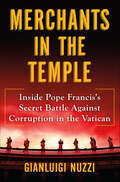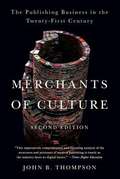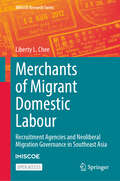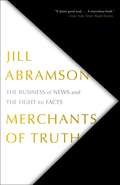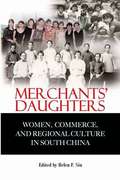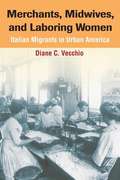- Table View
- List View
Merchants in the Temple: Inside Pope Francis's Secret Battle Against Corruption in the Vatican
by Gianluigi NuzziFrom a bestselling author with unprecedented access to Pope Francis, an investigative look at the recent financial scandals at the highest levels of the VaticanA veritable war is waging in the Church: on one side, there is Pope Francis’s strong message for one church of the poor and all; on the other, there is the old Curia with its endless enemies, and the old and new lobbies struggling to preserve their not-so-Christian privileges.The old guard do not back down, they are ready to use all means necessary to stay in control and continue the immoral way they conduct their business. They resist reforms sought by Pope Francis and seek to delegitimize their opponents, to isolate those who want to eliminate corruption. It’s a war that will determine the future of the church. And if he loses the battle against secular interests and blackmail, Pope Francis could resign, much like his predecessor. Based on confidential information—including top secret documents from inside the Vatican, and actual transcripts of Pope Francis’s admonishments to the papal court about the lack of financial oversight and responsibility—Merchants in the Temple illustrates all the undercover work conducted by the Pope since his election and shows the reader who his real enemies are. It reveals the instruments Francis is using to reform the Vatican and rid it, once and for all, of the overwhelming corruption traditionally encrusted in the Roman Catholic Church.Merchants in the Temple is a startling book that will shock every reader. It’s a story worthy of a Dan Brown novel, with its electrifying details of the trickery and scheming against the papacy—except that it is real.
Merchants of Culture: The Publishing Business in the Twenty-First Century
by John B. Thompson"All you need to know about the industry at a time of momentous change." -Drake McFeely, chairman and president, W.W. Norton & Company For nearly five centuries, the world of book publishing remained largely static. But at the dawn of the twenty-first century, the industry faces a combination of economic pressures and technological change that is forcing publishers to alter their practices and think hard about the future of the book.John Thompson's riveting account dissects the roles of publishers, agents, and booksellers in the United States and Britain, charting their transformation since the 1960s. Offering an in-depth analysis of how the digital revolution is changing the game today, Merchants of Culture is the one book that anyone with a stake in the industry needs to read.
Merchants of Grain
by Dan MorganThe first and only book to describe the seven secretive families and five far-flung companies that control the world's food supplies. Little has changed their central role since Morgan's best-selling book first appeared in 1979.
Merchants of Migrant Domestic Labour: Recruitment Agencies and Neoliberal Migration Governance in Southeast Asia (IMISCOE Research Series)
by Liberty L. CheeThis open access book discusses the market logic of recruitment agencies who deploy migrant domestic workers in Southeast Asia. Agencies are involved in all stages of worker migration trajectory – from their selection, to their training, and their management at the destination. The book describes how and why these private actors play such an outsized role in this kind of worker mobility, and examines their relations with employers, workers and state apparatuses. It focuses on agents operating in the largest migrant sending countries (the Philippines and Indonesia) and receiving countries (Malaysia and Singapore) in Southeast Asia. These pioneering migration industries in the region have established practices and norms that have and continue to diffuse to other world regions. This book is of interest to policymakers, practitioners, students and researchers in migration studies, global governance, gender and migration, globalization and development, Southeast Asian studies, and area studies in political science.
Merchants of Truth: The Business of News and the Fight for Facts
by Jill AbramsonFormer executive editor of The New York Times and one of our most eminent journalists Jill Abramson provides a &“valuable and insightful&” (The Boston Globe) report on the disruption of the news media over the last decade, as shown via two legacy (The New York Times and The Washington Post) and two upstart (BuzzFeed and VICE) companies as they plow through a revolution that pits old vs. new media.&“A marvelous book&” (The New York Times Book Review), Merchants of Truth is the groundbreaking and gripping story of the precarious state of the news business. The new digital reality nearly kills two venerable newspapers with an aging readership while creating two media behemoths with a ballooning and fickle audience of millennials. &“Abramson provides this deeply reported insider account of an industry fighting for survival. With a keen eye for detail and a willingness to interrogate her own profession, Abramson takes readers into the newsrooms and boardrooms of the legacy newspapers and the digital upstarts that seek to challenge their dominance&” (Vanity Fair). We get to know the defenders of the legacy presses as well as the outsized characters who are creating the new speed-driven media competitors. The players include Jeff Bezos and Marty Baron (The Washington Post), Arthur Sulzberger and Dean Baquet (The New York Times), Jonah Peretti (BuzzFeed), and Shane Smith (VICE) as well as their reporters and anxious readers. Merchants of Truth raises crucial questions that concern the well-being of our society. We are facing a crisis in trust that threatens the free press. &“One of the best takes yet on journalism&’s changing fortunes&” (Publishers Weekly, starred review), Abramson&’s book points us to the future.
Merchants' Daughters
by Helen F. SiuHistorians and anthropologists have long been interested in South China where powerful lineages and gendered hierarchies are juxtaposed with unorthodox trading cultures, multi-ethnic colonial encounters, and market-driven consumption. The divergent paths taken by women in Hong Kong and Guangdong during thirty years of Maoist closure, and the post-reform cross-border fluidities have also gained analytical attention. This collection provides further theoretical application of a "regional construct" that appreciates process, transcends definitive powers of administrative borders, and brings out nuanced gender notions. An interdisciplinary team uses fine-grained historical and ethnographic materials to map out three crucial historical junctures in the evolution of South China, from late imperial to contemporary periods, that have significantly shaped the construction of gendered space. Stressing process and human agency, the volume uses women's experiences to challenge dichotomous analytical perspectives on lineage patriarchy, colonial institutions, power, and social activism.
Merchants, Market and Monarchy: Economic Thought and History in Early Modern China (Palgrave Studies in the History of Economic Thought)
by Tengda HuaThis book explores the vital role of merchants within early modern China. Unlike European merchants, their Sino-colleagues have long been regarded as certain social pariahs after pre-Qin period, despite the fortune they made. The key mission of this monograph is to investigate whether the standing of merchants in the Ming Empire has been improved compared with their predecessors. Generally, their status is reflected in state-merchant relationship and their role in the market, which can be found in miscellaneous economic activities such as market monopoly, commercial taxation, international trade, and consumption.This book aims to be of relevance to students and researchers interested in early modern history, eastern commerce, Ming merchants, and contemporary global affairs.
Merchants, Midwives, and Laboring Women: Italian Migrants in Urban America (Ellis Island Centennial)
by Diane C. VecchioUsing Italian and American sources and rich oral histories, this study reveals that women in Italy had economic responsibilities that often included work experiences outside of the home, including jobs as midwives and businesswomen.
Merchants: The Community That Shaped England's Trade and Empire, 1550-1650
by Edmond SmithA new history of English trade and empire—revealing how a tightly woven community of merchants was the true origin of globalized Britain In the century following Elizabeth I&’s rise to the throne, English trade blossomed as thousands of merchants launched ventures across the globe. Through the efforts of these "mere merchants," England developed from a peripheral power on the fringes of Europe to a country at the center of a global commercial web, with interests stretching from Virginia to Ahmadabad and Arkhangelsk to Benin. Edmond Smith traces the lives of English merchants from their earliest steps into business to the heights of their successes. Smith unpicks their behavior, relationships, and experiences, from exporting wool to Russia, importing exotic luxuries from India, and building plantations in America. He reveals that the origins of "global" Britain are found in the stories of these men whose livelihoods depended on their skills, entrepreneurship, and ability to work together to compete in cutthroat international markets. As a community, their efforts would come to revolutionize Britain&’s relationship with the world.
Merck & Co., Inc. (A)
by Kevin J. MurphyMerck & Co., Inc., a major pharmaceutical company, is in the process of reviewing and evaluating its personnel policies and practices. Employee interviews revealed that rewards for excellent performance were not adequate: outstanding performers received salary increases that were, in many cases, only marginally better than those given to average performers. In many cases, outstanding performance was not even clearly identified. The objective is to have students wrestle with a common malady of performance appraisal systems: the tendency of managers to assign uniform ratings to employees regardless of performance. Alternative appraisal systems should be suggested and discussed.
Merck & Co., Inc. (B)
by Kevin J. MurphyIn late 1986, Merck revised its performance review and pay practices. The most important change was a shift from an absolute rating system to a forced-distribution system in which managers are forced to adhere to a given distribution of performance ratings. Other major revisions included revised rating categories, revised performance categories, and a shift in the timing of performance evaluations. A discretionary award program was also introduced. The objective is to have students discuss the costs and benefits of the revised performance plan, paying particular attention to the relative performance evaluation aspects of the new plan. Is it better than the plan it replaced? Is pay more closely related to performance under the new plan?
Merck & Co., Inc. (C)
by Kevin J. MurphyDiscusses the 1989 modified performance appraisal program by adding performance gradations and allowing for differences in employee rating distributions depending on the division performance for the year. The objective is to have students discuss the revisions in the plan, focusing on the effects of forced-distribution ranking systems with flexible targets.
Merck & Co., Inc.: Corporate Strategy, Organization and Culture (A)
by Michael Beer Perry L. FaganIn the early 1990s, Merck faced a series of challenges because of significant changes in its competitive and regulatory environment (e.g., growth in power of pharmaceutical buyers like managed care organizations led to price pressures and President Clinton's review of the entire U.S. health-care industry). The case describes the company under its previous CEO, and primarily under Ray Gilmartin, the new CEO. Discusses the strategic, organizational, cultural, and management challenges that Merck faced, as well as Gilmartin's change program from 1994 to 1998, which was aimed at helping Merck address these issues.
Merck & Co.: Evaluating a Drug Licensing Opportunity
by David Krieger Richard S. RubackThis explores the valuation of an opportunity to license a compound before it enters clinical trials. Describes Merck's decision tree evaluation process is presented. Information required to evaluate a specific licensing opportunity is provided, including the costs of the three phases of the review process, the revenues if approved, and the probability of various outcomes. It includes an introduction to decision tree analysis and valuation.
Merck Global Health Initiatives (A)
by James Weber James E. Austin Diana BarrettThe case series focuses on Merck's drug donation program and then raises new issues facing management about what to do about HIV/AIDS in Africa given the company's development of a new therapy. Describes collaboration among many parties including the Gates Foundation, other pharmaceutical companies, and the government of Botswana.
Merck Sharp & Dohme Argentina, Inc. (A)
by Lynn Sharp Paine Harold F. Hogan Jr.Describes the efforts of the new managing director of Merck's subsidiary for Argentina, Uruguay, and Paraguay to transform the organization and its culture. Focuses on a critical decision: whether to offer the son of a high-ranking official in the government's national health-care program a place in the company's highly selective intern program for young professionals.
Merck Sharp & Dohme Argentina, Inc. (B)
by Lynn Sharp Paine Harold F. Hogan Jr.Supplements the (A) case.
Merck-Medco: Vertical Integration in the Pharmaceutical Industry
by V. Kasturi Rangan Marie BellRecords the analyses and actions taken by Merck Pharmaceuticals in its acquisition of Medco, a channel intermediary (called "pharmacy benefit manager"). While many of its competitors seem to be faring poorly, Merck seems to have managed the Medco integration superbly.
Merck: Conflict and Change
by Clark Gilbert Ratna SarkarTracks Merck's efforts to adapt to changes in the pharmaceutical industry. Key challenges include adapting Merck's internally focused, science-led culture to a more open environment, where marketing performance has become increasingly important. Examines Merck's efforts to adapt to the external changes without compromising its internal values and capability architecture.
Merck: Covid-19 Vaccines
by Willy ShihCovid-19 infections were still climbing across the U.S. and many other parts of the world in September 2020, and it seemed that every time Ken Frazier, the CEO of Merck & Co. consented to an interview in recent months he always seemed to hear the same question, "Where's Merck?" The company, a leader in the global vaccine business had a low public profile even though it was working assiduously on two vaccine candidates for the SARS-CoV-2 virus that causes Covid-19. The U.S. Government had initiated a high profile program - Operation Warp Speed (OWS) - to accelerate the development of vaccines, but Merck was notably absent. Should Merck seek or accept funding from OWS, and what terms might accompany such an agreement?
Merck: Global Health and Access to Medicines
by V. Kasturi Rangan Katharine LeeThe case describes the effort of Merck, a global leader in pharmaceuticals, in making available its medicines to the poor. The challenge for the company (or for that matter, any pharmaceutical company) is how to integrate its business strategy with its corporate social responsibility, especially when operating in "lower income" countries.
Merck: Global Health and Access to Medicines
by V. Kasturi Rangan Katharine LeeThe case describes the effort of Merck, a global leader in pharmaceuticals, in making available its medicines to the poor. The challenge for the company (or for that matter, any pharmaceutical company) is how to integrate its business strategy with its corporate social responsibility, especially when operating in "lower income" countries.
Merck: Managing Vioxx (A)
by Natalie Kindred Robert L. Simons Kathryn RosenbergThis two-class case series allows students to stand in the shoes of CEO Ray Gilmartin during the unfolding stages of a reputational crisis. Merck's mission statement claims to "put patients first," but the company is widely criticized for putting profit before patient safety. The (A) case describes the discovery of Vioxx, a new arthritis drug, and asks students to calculate the drug's lifetime expected value. Supplements are handed out in class as the story unfolds: (B) evidence of life-threatening side effects, (C) decision options, (D) announcement to withdraw Vioxx, (E) reaction by patients, shareholders, media, and regulators, (F) Merck fights back, and (G) wrap-up. At the end of the case series, students may conclude that doing the right thing sometimes requires very hard choices.
